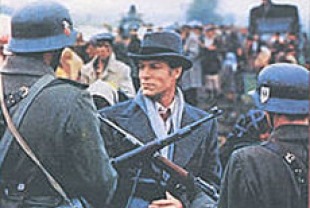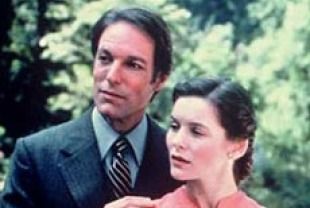Wallenberg was born into the wealthiest family in Sweden. He was an aristocrat and a Lutheran. His country had remained neutral throughout World War II, and the fighting would be over within a year. Yet he was willing to leave everything behind and go to the storm center of war-torn Europe on a dangerous and purely humanitarian mission to rescue Hungary's besieged Jews. He courageously — often individually — confronted the last gasp of Nazi terror.
He is credited with saving nearly 100,000 lives, one-eighth of Hungary's Jewish community, more people than were rescued by any other individual or institution in Europe. He demonstrated a boundless talent for compassion.
Richard Chamberlain stars as Wallenberg. Others in the outstanding international cast are Bibi Andersson, Alice Krige, Kenneth Colley, Melanie Mayron, and Stuart Wilson. Lamont Johnson, who is the co-producer with Richard Irving, directs from a screenplay by Emmy Award-winner Gerald Green (Holocaust).
The Story
In April 1944, Germany has retreated from Russia. In occupied Hungary, the Nazis plan to complete the "Final Solution," the extermination of Europe's Jews. They are supported by the Arrow Cross, a Hungarian fascist and anti-Semitic organization. Within two months, 400,000 Jews are deported from the Hungarian provinces to the Auschwitz and Birkenau concentration camps.
SS Lt. Col. Adolf Eichmann (Kenneth Colley), chief of the Gestapo's Jewish section, is supervising the campaign against the Jews of Budapest, one of the largest Jewish communities remaining in Europe. The Nazi bureaucrat attends a party hosted by Admiral Nikolas Horthy (Guy Deghy), the Regent of Hungary, and expresses his displeasure at the Hungarian's protection of some Jews. Meanwhile in the city, Arrow Cross youth are burning a synagogue. Teicholz (Ralph Arliss) and Nikki Fodor (Mark Rylance), who are active in the Jewish resistance, warn the Jewish musical society, including Hannah (Georgia Slowe) and her father Tibor Moritz (Olaf Pooley), to stay off the streets.
In Sweden, at the country estate of the Wallenbergs, a rich and illustrious banking family, the scene is very different as they celebrate the beginning of spring. Maj von Dardel (Bibi Andersson) is the mother of 32-year-old Raoul Wallenberg (Richard Chamberlain), who has studied architecture in America and is now working in the import-export business. Both she and Uncle Jacob (Keve Hjelm) are embarrassed when Raoul does a satirical impersonation of Hitler in front of a German guest. Raoul's humor masks a deeply felt anger at the Nazi persecution of the Jews and the indifference of his fellow Swedes to their fate.
When Wallenberg is approached to head a rescue mission for Hungary's Jews sponsored by America's War Refugee Board, he immediately realizes it is his opportunity to make a difference. He is given diplomatic rank as a secretary in the Royal Swedish Legation in Budapest. The Swedish Foreign Ministry agrees that he will be free to use unorthodox methods if necessary to save Jews.
Arriving in Budapest in early July 1944, Wallenberg is briefed by Per Anger (David Robb), a Swedish diplomat who has initiated a modest rescue operation by distributing protective passes to Jews who can establish a family or business connection in Sweden. Eichmann has begun mass arrests and deportations in Budapest, and the Embassy is swamped with requests for the passes.
After a meeting in which Eichmann tries to smooth talk the Jewish Council into providing volunteer workers for the German war effort, he is enraged to learn that Horthy, responding to an appeal from Sweden's King Gustav delivered by Wallenberg, has turned back a train carrying 12,000 Jews to the concentration camps. Later, at a nightclub, Eichmann meets his newly arrived adversary and scoffs at his humanitarian mission. The Swede realizes why the Nazi has been nicknamed "the Bloodhound."
Wallenberg sets up headquarters and staffs his operation with Jews, including Sonya (Melanie Mayron), a former teacher with a young son. The old protective passes are redesigned to look more official and to give the bearer the full protection of the Royal Swedish Legation. Wallenberg convinces Horthy to recognize the validity of 4,500 of these "schutz-passes" for Budapest Jews. Nikki Fodor obtains one pass, and the Jewish resistance begins forging copies.
Wallenberg arranges sanctuary for the protected Jews in "safe houses" flying the Swedish flag. Food and clothing are gathered for the refugees. His example inspires other neutral diplomats from Switzerland, Spain, Portugal, and the Vatican to provide shelter and issue passes of their own. When Eichmann abruptly leaves for Germany in late August, Wallenberg and Anger wonder if they might be making progress in their fight.
All the combined efforts are jeopardized, however, when in October 1944 Horthy is forced to abdicate and the Germans move into Hungary in greater strength. Colonel Ferencz Szalasi (Aubrey Morris), head of the Arrow Cross, assumes power. Members of his party begin executing Jews in the streets. The neutral countries' protective passes are declared invalid. Eichmann returns and announces to the Jewish Council that Jews are needed in the labor camps and will be marched there.
Wallenberg is undaunted. Armed only with books containing the names of those who have been given Swedish passes, he goes to a work brigade and demands that protected Jews be released to him. As Nikki, Hannah and Tibor Moritz watch, he stares down the SS captain standing in his way.
When the Nazi persecution and Arrow Cross atrocities increase, Wallenberg uses diplomatic ploys, ruses and bluffs to pull Jews out of the work camps. He turns to a new ally, Baroness Liesl Kemeny (Alice Krige), the young Catholic wife of Foreign Minister Baron Gabor Kemeny (Stuart Wilson). She is shocked by his account of the Nazis' treatment of the Jews and alarmed when he warns that her husband could be executed as a war criminal if he continues to support the Arrow Cross and Nazi policies. She persuades the Baron to have the validity of the protective passes re-established.
In a face-to-face encounter with Eichmann. Wallenberg demands that he stop the deportations. The German is unmoved by appeals or threats. He orders Wallenberg killed, but the attempt fails.
The death marches commence in early November. Thousands of Jews are herded out of the city by SS and Arrow Cross guards. Sonya and her son are among those forced from one of the Swedish safe houses. In a desperate attempt to save them and some 400 other Jews, Wallenberg and Anger drive to the train station. After bribing the guards, they literally pull the Jews off the train. Later, Raoul bids farewell to Baroness Kemeny, who has been exiled to Italy. The Russians are just outside Budapest.
Wallenberg and Eichmann meet again. The Nazi boasts about his accomplishments when asked once again to spare the Jews. He leaves for Vienna after instructing his men to kill the Jews in Budapest's central ghetto. Wallenberg intervenes and convinces the SS general in charge to countermand the order.
Russian troops enter the city. Wallenberg has designed a relief plan for Budapest and prepares now to take it to the Russian command. On the way to Debrecen, his car is stopped. On January 17, 1945, Raoul Wallenberg is taken into Russian custody. No explanation for this action is given.
Wallenberg's Legacy
After Wallenberg was taken into what was later termed "protective custody" by the Russians as Budapest was being liberated, he disappeared into the Russian prison system. What happened to him there was never determined to the satisfaction of his family and friends. After repeated requests for information about him, the Soviet Union in 1957 announced that he died in July 1947. No evidence was produced to support the claims, and it was stated that all persons witness to his death were also dead. Nevertheless, reports from prisoners coming out of the Soviet gulag have led some to believe that Wallenberg was alive through the 1970s.
Although his fate is unknown, Wallenberg's legacy is secure — not only in the lives of those he saved, but also in his example of compassion and courage. On the way to the Holocaust Museum on the western outskirts of Jerusalem is an avenue of trees. Each tree commemorates a Gentile who risked his or her life to save Jews during the Hitler years. The medal identifying each "Righteous Gentile" contains a Talmudic inscription: "Whoever saves a single soul, it is as if he saved the whole world." One of them is the Raoul Wallenberg tree.

